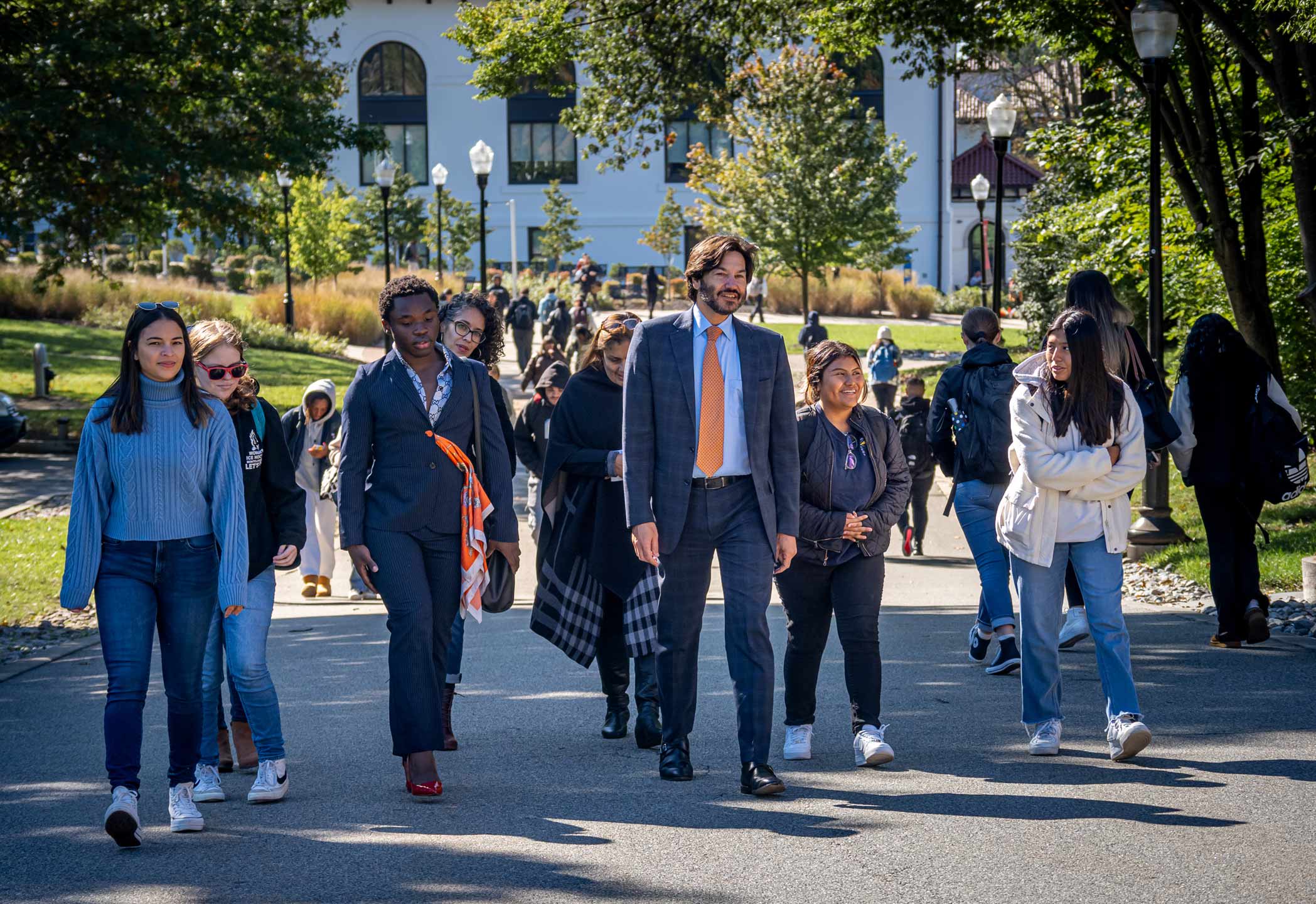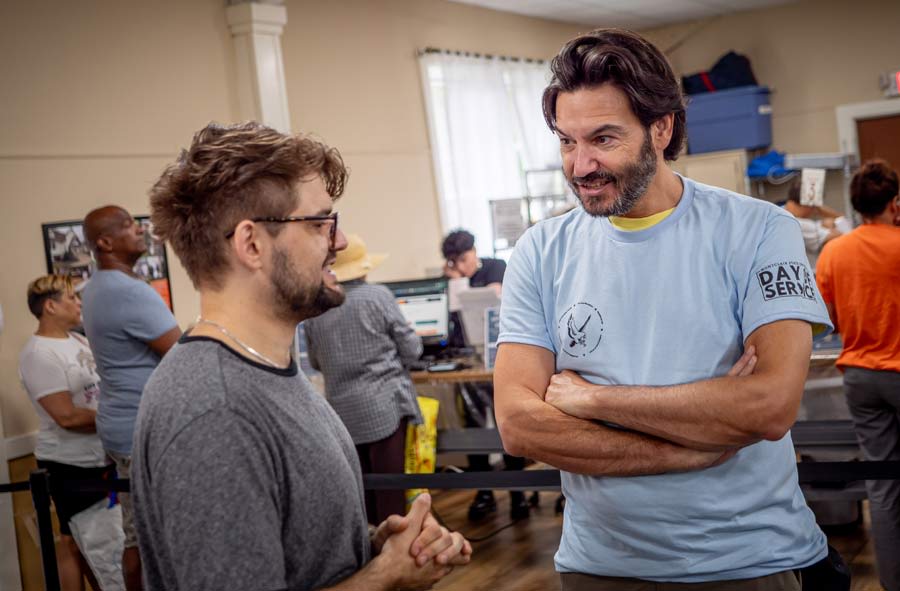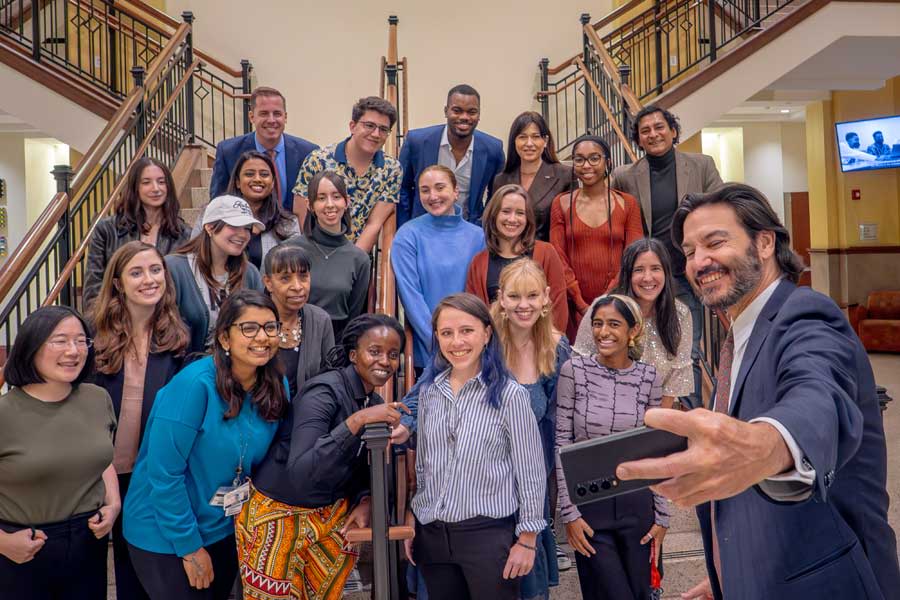Is college worth it?
An interview with Jonathan Koppell,
president of Montclair State University
The president of this New Jersey institution says the “is college worth it?” debate should consider the role of institutions as engines of public good that bring enormous value to their communities and the nation.

As the price of higher education and the debt taken out to afford it continue to climb, students, families and the public are asking more urgently: Is college worth it?
The nation’s colleges and universities find themselves under tremendous pressure to produce graduates with the skills to compete in the 21st century economy. But Jonathan Koppell, Ph.D., president of Montclair State University in New Jersey, argues that the question about college’s value should not focus exclusively on whether a degree is worth the expense in terms of individual earnings.
While graduates should see returns on their higher education investment, Koppell — a leading national scholar of policy and management — contends that this debate also should encompass the enormous value universities bring to their communities, states and the nation as engines of public good.
Here, Koppell discusses how universities must answer their critics by jumping “into the arena” to help students thrive and demonstrate how they propel economic and community vitality.
JONATHAN KOPPELL, Ph.D.
Currently: Ninth president of Montclair State University (since Aug. 2021)
Previously: Arizona State University (2010 to 2021), where he was dean of the Watts College of Public Service and Community Solutions, vice provost for public service and social impact, and the endowed Lattie and Elva Coor Presidential Chair as Professor of Public Administration.
Education: Doctorate in political science from University of California, Berkeley; bachelor’s in government from Harvard University.
About Montclair State University: The second-largest higher education institution in New Jersey, Montclair has more than 23,000 students enrolled in more than 300 majors, minors, concentrations and certificate programs across 13 schools and colleges. It ranks as the No. 104 best college in the nation by The Wall Street Journal and No. 7 nationally for social mobility by U.S. News & World Report.
To learn more: Visit www.montclair.edu
Let’s get right to it. Is college worth it?
Koppell: For the individual who chooses to go to college, the answer is yes. When you're talking about income or health or life satisfaction, by every measure people with a college degree are better off than people without one. The ROI on a college degree is one of the best investments anybody can make.
But there's a bigger question implicated by the “is college worth it” question. Critics now argue that the country has not been well served by higher education. The claims are broad and varied — everything from the cultural and ideological to the economic ramifications of having so many people take on so much debt to attend college. But the conclusion that the collective investment in higher education has not been beneficial to our country is just nonsense and disconnected from reality.
Students, professors, alumni and staff convey attributes of Montclair State University, including academics, value and a sense of belonging.
So you’re saying that college has value beyond the individual return on investment?
Koppell: That’s correct. It’s unquestionably the case that improving access to higher education and increasing the number of people with college degrees have been major contributing factors to our nation’s prosperity. Because of the GI Bill and the expansion of higher education starting in the 1940s, more people were getting college degrees than at any time in our history. College was extremely affordable because the cost of those public universities was borne substantially by the public. We collectively decided that college was worth it for society.
That's the key point: Everyone, whether they got a college degree or not, benefited from a population that had access to higher education. It made the United States a destination for manufacturing, research and other businesses that thrive in a market with a highly educated populace. American universities also became magnets for talent that spawned countless innovations. It made us a wealthier country.
We've lost connection with the idea that higher education is a public good, and I think we have to get back to that. That doesn't mean that every single person should get a college degree. But it is historically the case that societies that are highly educated, and where access to educational opportunity is broader, prosper relative to those with less access. Within societies, groups denied access — like the black veterans who did not have GI Bill benefits — fared less well. By backing off from the social commitment to invest in college access, we've been retreating from that idea that an educated society is a more prosperous, healthy society.

If higher education is valuable to both individuals and society, why is public opinion of it so negative?
Koppell: Many reasons. People are dissatisfied with college completion rates. That's a legitimate criticism. The more challenging point is: Are we appropriately attuned to our responsibility to prepare people for post-college success? Could we be more self-critical about whether we're doing that well or not? I think the answer to that is yes as well.

Of course, it has become a political strategy to attack universities. I think the reflexive behavior is to push back and say, “This is outrageous! How can you say that?” Some of the criticisms are grossly unfair, and they're not intended to be honest. But some of the issues are beyond higher education. The reality is that the gains in prosperity over the last 30 years have not been shared as equitably as in previous eras. So the “rising tide” argument is just weaker.
Nevertheless, we can and should own our shortcomings. For many years we didn't bother to explain why we do things. That's where we can get better — by being more engaged and more transparent about what we're trying to achieve and why. By not engaging, you let your critics define the terms.
Here's the reality: There are more people in this country who went to college and don't have a degree than do, and millions of them borrowed money to attend college that they can’t afford to repay. We have to answer for that and not be surprised that many people don’t feel warm and fuzzy about us. We need to understand how our students get disrupted, anticipate those challenges and intervene effectively.
One of my heroes is Teddy Roosevelt, who famously said, It's not the critic who counts; it's the man in the arena. That applies to us, too. The university needs to enter the arena. That doesn't simply mean being a pugilist. It means being willing to change and offer solutions while punching back at critics. We need to be constantly asking, what can we do differently and better to stop having the same outcomes that are so frustrating to so many people?
What makes a college education worth it for Montclair students?
Koppell: The experience and the end results. Montclair State University is a rare bird. We’re a majority-minority and Hispanic-Serving Institution that is among the top tier of R2 doctoral research universities. Half of our students are eligible for federal Pell grants, and over 40% are first-generation college students. Our students graduate at a rate that’s nearly 20% higher than you would anticipate based on those demographics.

The Wall Street Journal has an interesting way of ranking universities. It looks at how long it takes for a student, given the marginal impact on income of a particular school’s degree, to cover the net cost associated with that degree. For Montclair graduates, the answer is less than two years. That shows just how good a job we're doing of being an engine of opportunity.
Our students come here because they see they have a very high probability of graduating in a strong position to succeed professionally. Contrary to what some people say, it’s not necessarily about maximizing their post-college salary. Students have a much broader view of what they want college to do than that syllogism suggests. They want to grow. They are very concerned about the future of the planet and the country and want to make a difference in the world.
So many Montclair students I talk to feel like they got all this from their college experience. Even balancing jobs and family responsibilities, they take in every hands-on learning opportunity, and they benefit from studying in an incredibly diverse community. That’s what makes college worth it for our students. I have the utmost respect for them.
This content is paid for and provided by Montclair State University and developed by Inside Higher Ed's sponsored content team. The editorial department of Inside Higher Ed had no role in its production.
